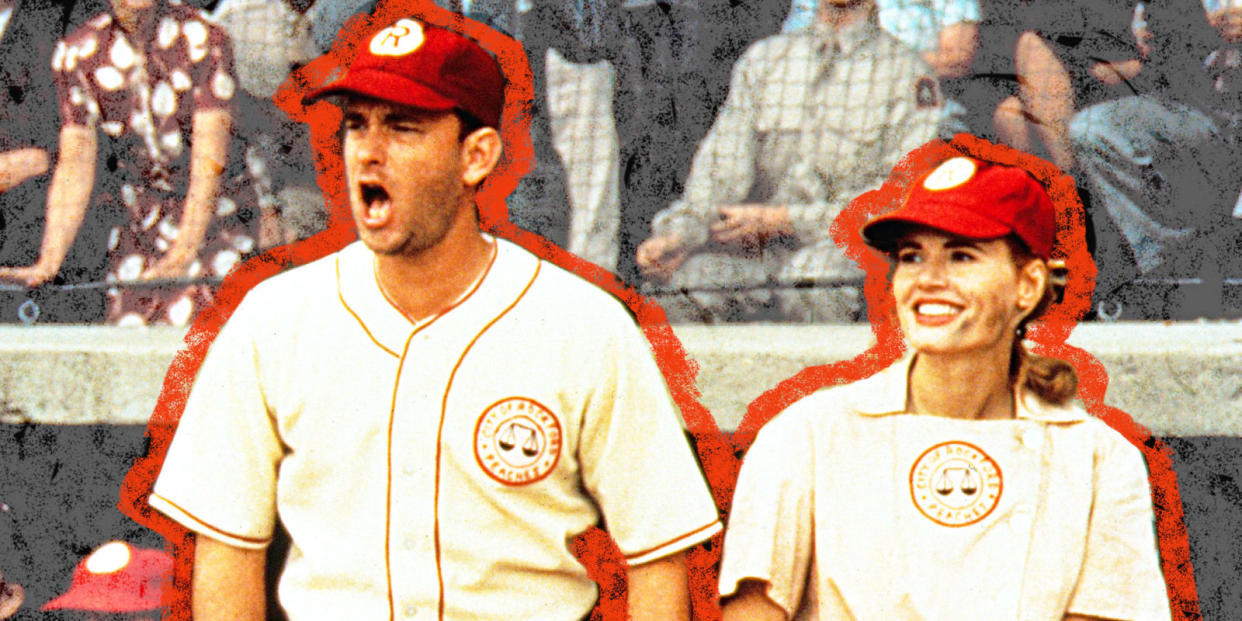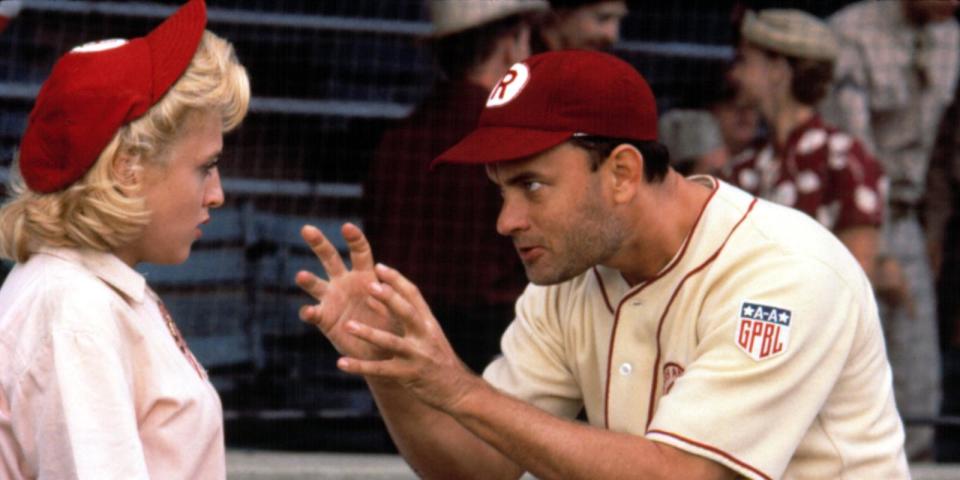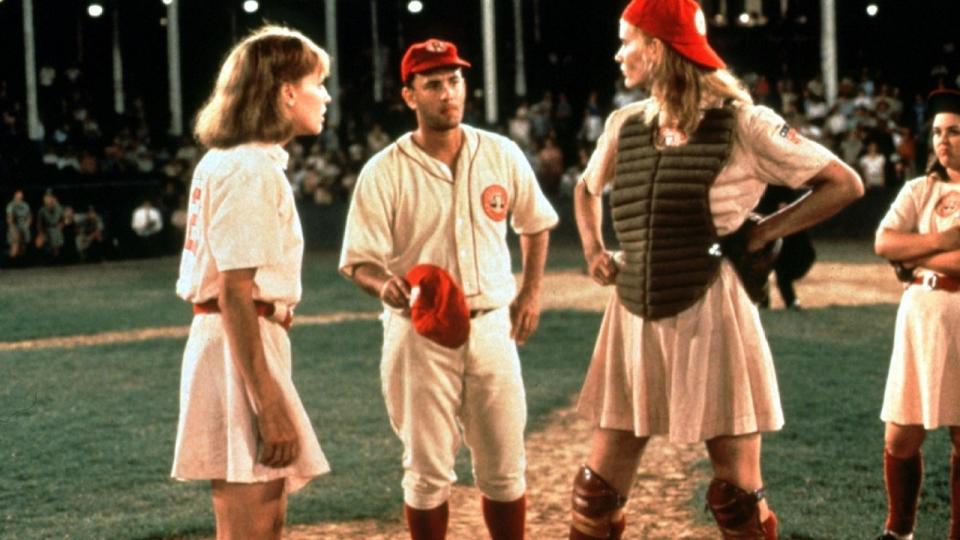What Makes 'A League of Their Own' One of the Best Baseball Movies Ever Made

A League of Their Own, Penny Marshall's blockbuster comedy about the All-American Girls Professional Baseball League, turns 25 this weekend. For a very specific subset of a generation, it has endured as the greatest baseball movie of its time-if not one of the greatest sports movies altogether. The Great Serious American Baseball Film, as I learned to fall in love with it, was first and foremost about men-men and their battle against some inevitability hovering over them, be it age or love or loss. Roy Hobbs is a complicated and triumphant hero, and so is Crash Davis, and so is Billy Chapel, and so on.
There's a scene I like in A League of Their Own, near the beginning, when the women take to the field for tryouts. Dottie Hinson is a towering figure in the American Baseball Film narrative, something cemented near the start of the film when, after a tense interaction, Rosie O'Donnell's Doris Murphy spins and throws a fastball at Hinson from close range. Hinson, without even blinking, catches it with her bare hands.
In the spirit of most sports stories fashioned into film, the original story of the Rockford Peaches and the All-American Girls Professional Baseball League isn't as interesting as it looked on film. The Peaches were one of just two teams to play every season in the AAGPBL, which inevitably also led to them being one of the most successful teams in the league's history–winning four titles during their run. But the Peaches were also a team that valued flash over skill, often known for errors in attempts to make stylish play. When former player Eileen Burmeister was asked about the teams theatrics, she once replied: "If God meant for us to play baseball, He would've made us any good at it."
Perhaps the most heroic thing about the women in A League of Their Own is that its players aren't particularly framed as overcoming anything as large as life or death. We imagine the struggle as romantic when there is a closeup of a man's hand on the pitching mound, rotating as if trying to regain feeling in his fingers to power past one final out, so that he might get the glory he's long imagined that he deserved. In real life and in the film, the AAGPBL existed as a function of war. It is a baseball film that blooms, largely, from the absence of men.
A League of Their Own is a baseball film that blooms, largely, from the absence of men.
The central man in the film-Peaches manager Jimmy Dugan, played by Tom Hanks-is vital, but it can be said that he exists largely as a vehicle to highlight Dottie's immense persona. Dugan becoming more human as the film goes on is almost entirely in response to Dottie. Dugan, the once great baseball star, is a character that is all parts repulsive, endearing, and predictable. His softening through the film is a footnote, a plot point that isn't entirely fleshed out, and yet one that's still refreshing to take in. Yes, part of it was due to a bit more mothering than I think some would have liked to have seen out of Dottie who on the field was a superhero and off of it was levelheaded and rational in the face of all else. But the Hinson/Dugan tension-a tension that relied so little on any romantic payoff-is a delightful thread to track underneath the movie's greater story.

With that in mind, it must be said that A League of Their Own also created a story in which romance was not the vehicle through which the women were defined. And yet, when there was romance, it was often arrived at on the women's own terms. Be it Madonna, who was about halfway into her film career, playing "All The Way" Mae Mordabito, the skilled centerfielder who was also written to come equipped with the aura of early-'90s Madonna sex appeal, which alone didn't define the character. Or be it Marla Hooch, played by Megan Cavanagh, whose looks were first a tired and useless punchline until they suddenly weren't. The great thing about Hooch in particular, who eventually found a man who loved her for her, was that her character's confidence-like all of the women in the film-wasn't tied to a man's affection.
The romantic elements in A League of Their Own are all perfunctory, largely filler. The film could operate without romance altogether if not for the hovering idea of the men who are off at war while the women they love are living entire lives miles away. Of its several enduring qualities, A League of Their Own's most potent is who it decides to rely on, and who it decides not to.
I think a lot about siblings and the sometimes unfortunate bond between them. Here is how A League of Their Own isn't different from most of the movies in the American baseball canon, at least the ones that aren't comedies: They all, at some point or another, are about family at the core, and whatever else echoes out from that. Fathers and sons, or brother and brother, or even kids who spend so much time together in the machinery of summer that they might as well be kin. But there is no exploration like that of the sisterhood shared by Dottie and her little sister, pitcher Kit Keller.

For anyone who grew up with an older sibling who was a star athlete, as I did, Dottie and Kit weaved a familiar dance: for Kit, the thin line between admiration and jealousy and for Dottie, the slightly thicker line between concern and dismissal. In the movie's turning point, Dottie and Dugan approach the mound in a playoff game where Kit is struggling. Dugan asks Dottie if she thinks her sister should come out the game and Dottie, conflicted and seeing how much her sister wanted to stay in, tells the manager to pull her. And that's it. The moment that caused a fracture that we don't see heal until the end of the movie, when both of the women are significantly older, long removed from the game.
A League of Their Own is the greatest baseball movie-one of the few still capable of surprising me due to its layering and emotional depth. It is about family, those distant and close. It's about love, for a game and those we chose it over. And, largely, I think it endures because it still feels special-All-American in a way that traffics more in an escape than it does in reckless patriotism. America's pastime, turned on its ear. A story that seems too good to be true, and so it is half-true and still all good. It's still the perfect way to make a summer feel endless.
Rent/Buy A League of Their Own on Amazon and iTunes.
You Might Also Like

